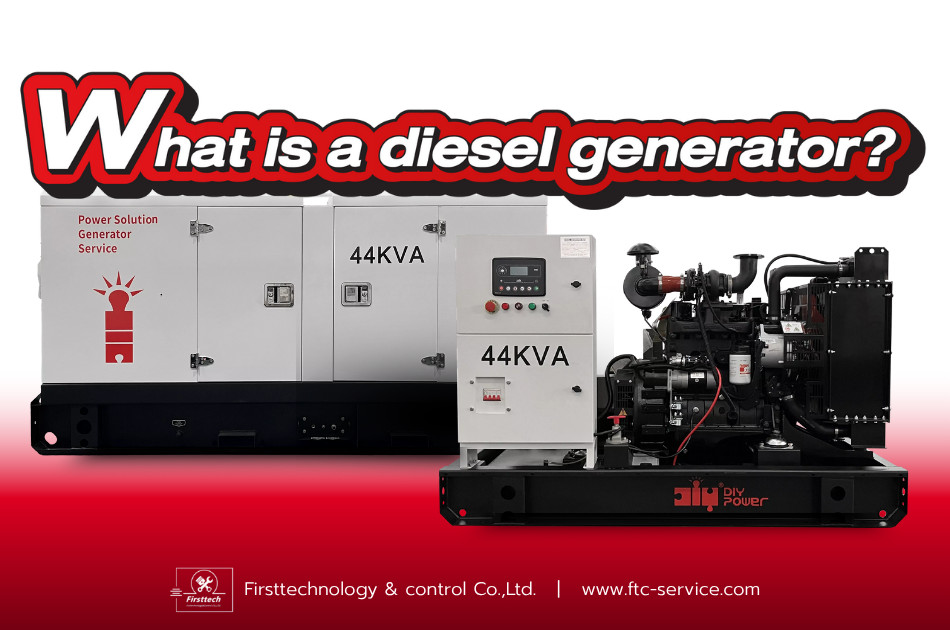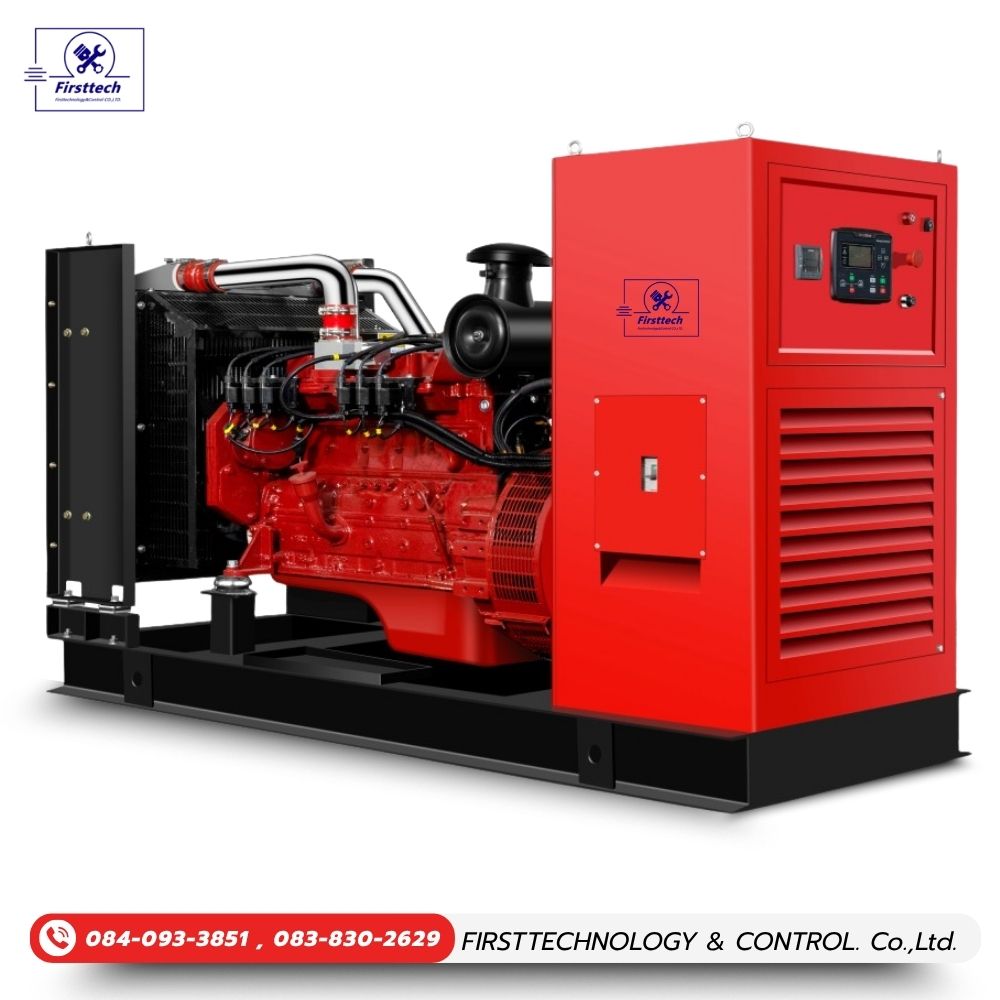

What is a biogas generator and how does it work?
Biogas generator is a power generation system that uses “biogas” as the main fuel. Biogas is a biogas that is obtained from the decomposition of organic matter. Such as animal waste, food scraps, or waste from agriculture and industry through the anaerobic digestion process.
The working process of the system.

- Biogas production: Organic raw materials are sent to a digester where microorganisms decompose the organic matter and release methane (CH₄) as the main gas, along with carbon dioxide (CO₂) and other gases.
- Gas collection and treatment the gas obtained will be sent through a filtration process to remove impurities such as sulfur and water vapor to obtain biogas suitable for use in engines.
- Electricity production: : The treated biogas is fed into an internal combustion engine or gas turbine, which is connected to an alternator to produce electricity.
Highlights of biogas generators.
Using a biogas generator has many advantages over conventional diesel or gasoline-powered generators, including.
- Environmentally friendly, reducing greenhouse gas emissions because biogas uses organic waste that has already naturally decomposed, reducing waste that needs to be disposed of in other ways, such as landfill.
- Reduces electricity costs. Suitable for farms, factories or businesses that already have a large amount of organic waste. Can be used as raw material to produce electricity for free or at low cost, reducing reliance on electricity from the government or reducing fuel usage.
- Generate income from excess energy. Excess electricity can be sold to the electricity authority in the Net Metering or Feed-in Tariff system.
- Reduce the amount of waste. Organic raw materials that go through the biogas production process can also be used as organic compost.
Who is the biogas generator suitable for?
| Business group/industry | Reasons to use biogas |
|---|---|
| Agriculture and livestock dairy farms, pig farms, animal feed mills | There is a large amount of organic waste. Animal waste can be used as a raw material and reduce odors that disturb the community. |
| Food-beverage factory | Food scraps, cassava pulp and wastewater are good fuels, reducing waste disposal costs. |
| Municipal wastewater treatment plant | Biogas generated from wastewater sludge has potential for power generation within the plant. |
| Paper and Pulp Industry | There is lignin and digested wood residue, CHP feeds steam back into the machine. |
| Commercial building groups (hospitals, universities, large hotels) | Using food waste together with wastewater on-site to generate electricity and hot water for use. |
- Animal farms such as pig farms and cow farms that produce a large amount of organic waste from animal manure per day can be used as a raw material for biogas fermentation effectively.
- Food processing plants such as canned food factories, juice factories, slaughterhouses, sugar factories, which often have a large amount of waste that can be fermented into biogas.
- Biomass processing plants, such as ethanol or biodiesel production plants, which produce a large amount of wastewater and waste materials from production.
- Large agricultural businesses, including farmer groups or community enterprises that can combine waste from multiple sources to produce energy together.
- Municipalities and local administrative organizations use organic waste management systems in communities to produce electricity for internal use, reducing waste burdens and electricity costs.
How to choose the right biogas generator for your business.
Choosing a biogas generator should not be based solely on price, but should also consider several factors, such as.
- The amount of organic raw materials is calculated from the waste available each day to see if it is enough to produce biogas. If there is a large amount of raw materials, a larger machine can be chosen to be more cost-effective.
- Size of electricity demand Consider how much electricity your business needs per day, such as 50 kW, 100 kW or more. Choose a generator with a size (kVA or kW) that is appropriate for your business’s actual load.
- Usage characteristics If you want to use it continuously all day, you must choose a generator that supports heavy work and has a good cooling system. If you use it as a backup power, you may choose a smaller size.
- Control and safety system: You should choose a machine with a Generator Control System (GCS) that has automatic control functions, temperature and pressure warnings, and an automatic shutdown system when an abnormality occurs.
- Expert installers should choose a company with experience in designing and installing complete biogas systems, such as gas production systems, filtration systems, and electrical systems. They also have after-sales service, spare parts, and long-term maintenance.
Biogas generators are the future of clean energy.
Biogas generator is an electricity generation system that uses “biogas” as the main fuel. Biogas is a biogas that is obtained from the decomposition of organic matter such as animal waste and food waste. It is suitable for the world that is facing energy and environmental problems. Environment Biogas generators are another answer that is both cost-effective and sustainable. By converting waste into energy, it helps reduce electricity costs and is also environmentally friendly. Suitable for a variety of businesses with large amounts of organic waste, such as farms, processing plants, or local government organizations. Choosing the right biogas generator. Consideration should be given to the quantity of raw materials, power requirements, control systems, and expertise of service providers to ensure an efficient, long-lasting system that truly meets business needs. If you are looking for a clean energy solution for your business, don’t hesitate to consider a biogas generator as the first step towards a sustainable and growing business in the long run.
Related Articles

First Technology and Control Co., Ltd.
We manufacture and supply Biogas Generator Sets, as well as gasoline and diesel generators. Our products include complete control systems: Control Panels, ATS Controllers, AVR units, Generator Speed Control Units, and Gen-set Controllers.
Contact
- 109/1 Soi Bang Khun Thian 14, Samae Dam Sub-district, Bang Khun Thian District, Bangkok 10150, Thailand
- 084-093-3851
- 083-830-2629
- firsttechnology@hotmail.com
Copyright ©2025 | Powered by First Technology and Control Co., Ltd.

